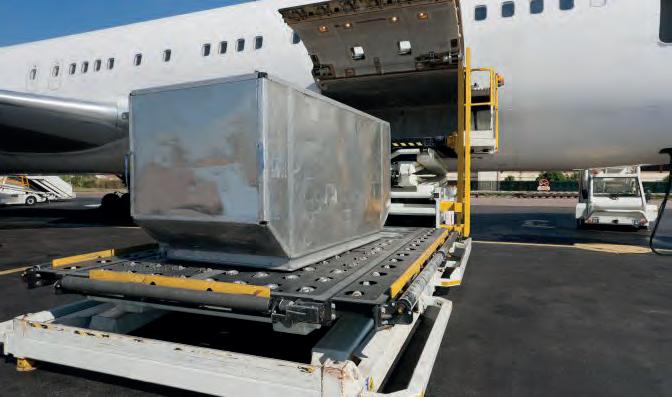
3 minute read
THE FUTURE OF AIR CARGO TECHNOLOGY
Air cargo technology has witnessed significant advancement in recent years, revolutionising the way goods are transported by air around the world. The integration of various technologies, such as artificial intelligence (AI), the Internet of Things (IoT), digitalisation and sustainable practices, has greatly improved the efficiency, safety and sustainability of air cargo operations. This supplement explores these innovations and their impact on air cargo technology. Artificial intelligence (AI) has emerged as a powerful tool in the air cargo industry. AI algorithms can analyse large volumes of data and provide valuable insights to optimise various processes. For instance, AI-powered predictive analytics can help forecast demand patterns, enabling airlines and cargo operators to better plan their operations, allocate resources and streamline supply chains. AI algorithms can also improve route planning, cargo tracking and real-time decision making, resulting in faster and more reliable deliveries.
The Internet of Things (IoT) has transformed the way cargo is monitored and tracked during transportation. IoT devices equipped with sensors can collect real-time data on various parameters such as temperature, humidity, shock and location. This data is transmitted to a central system, enabling stakeholders to monitor cargo conditions and take necessary actions to prevent damage or delays. IoT technology also facilitates seamless communication between different entities involved in the supply chain, enabling better coordination and improved operational efficiency. Digitalisation has played a crucial role in enhancing the efficiency and transparency of air cargo operations. Digital platforms and systems enable end-to-end visibility of shipments, allowing stakeholders to track cargo in real-time and access critical information such as customs documentation, compliance requirements, and delivery status. Electronic documentation and automated processes reduce paperwork, minimise errors and accelerate customs clearance procedures. Additionally, digital platforms enable seamless integration and data sharing among different stakeholders, fostering collaboration and improving overall supply chain performance.
Advertisement
Sustainability and environmental considerations have become increasingly important in the air cargo industry. “Greening the apron” refers to the implementation of sustainable practices on the ground, particularly during aircraft loading and unloading operations. For instance, the use of electric or hybrid ground support equipment reduces emissions and noise pollution at airports. Furthermore, the adoption of renewable energy sources, such as solar power, for ground operations contributes to reducing the carbon footprint of air cargo operations. Sustainable practices not only help mitigate the environmental impact but also improve the overall efficiency and cost-effectiveness of cargo handling.
De-staffing, or the automation of certain tasks previously performed by human workers, is another emerging trend in air cargo technology. Automated systems and robotics are being increasingly utilised for tasks such as cargo sorting, baggage handling and inventory management. These technologies not only improve efficiency but also enhance safety by reducing the risk of human error. However, it is important to strike a balance between automation and human intervention to ensure effective operations and maintain a human touch where necessary.
Loading and unloading aircraft have traditionally been labour-intensive processes. However, technological advancements have streamlined these operations and reduced turnaround times. Automated cargo handling systems, such as robotic arms and conveyor belts, facilitate efficient loading and unloading, minimising delays and optimising space utilisation within the aircraft. Additionally, intelligent cargo containers equipped with sensors and RFID tags enable seamless tracking and monitoring of individual shipments, ensuring accurate handling and minimising the risk of loss or damage.
In conclusion, air cargo technology has witnessed remarkable advancements, driven by the integration of AI, IoT, digitalisation, sustainability practices, de-staffing and innovations in loading and unloading aircraft. These technologies have transformed the air cargo industry, enhancing efficiency, safety, and sustainability. By leveraging AI and IoT, cargo operators can optimise operations, improve supply chain management, and enhance customer satisfaction. Digitalisation enables seamless data sharing and real-time visibility, facilitating better decision making and collaboration among stakeholders.
The adoption of sustainable practices, such as greening the apron and the use of renewable energy, contributes to reducing the environmental impact of air cargo operations. Moreover, de-staffing and automated cargo handling systems streamline processes, reduce errors and improve overall efficiency. With ongoing advancements and innovations, the future of air cargo technology looks promising, enabling further improvements in the industry’s capabilities and performance.
Editor: James Graham
Associate Editor: Chris Lewis
Director of Operations: Kim Smith
International Sales Director: Rosa Bellanca
International Sales Executive: Zainab Khalid
Finance Manager: Rachel Burns
Video Director: Michael Sales
Design & Production Manager: Alex Brown
Production Supervisor Kevin Dennis
Website Consultant: Tim Brocklehurst
Directors: Norman Bamford • Dawn Jolley
The views and opinions expressed in this publication are not necessarily those of the publishers. Whilst every care is taken, the publishers cannot be held legally responsible for any errors in articles or advertisements. No part of this publication may be reproduced, stored in a retrieval system or transmitted in any form or by electronic, mechanical, photographic or other means without the prior consent of the publishers. USA: The publishers shall not be liable for losses, claims, damages or expenses arising out of or attributed to the contents of Air Cargo Week, insofar as they are based on information, presentations, reports or data that have been publicly disseminated, furnished or otherwise communicated to Air Cargo Week.
INTERNATIONAL AZ URA









